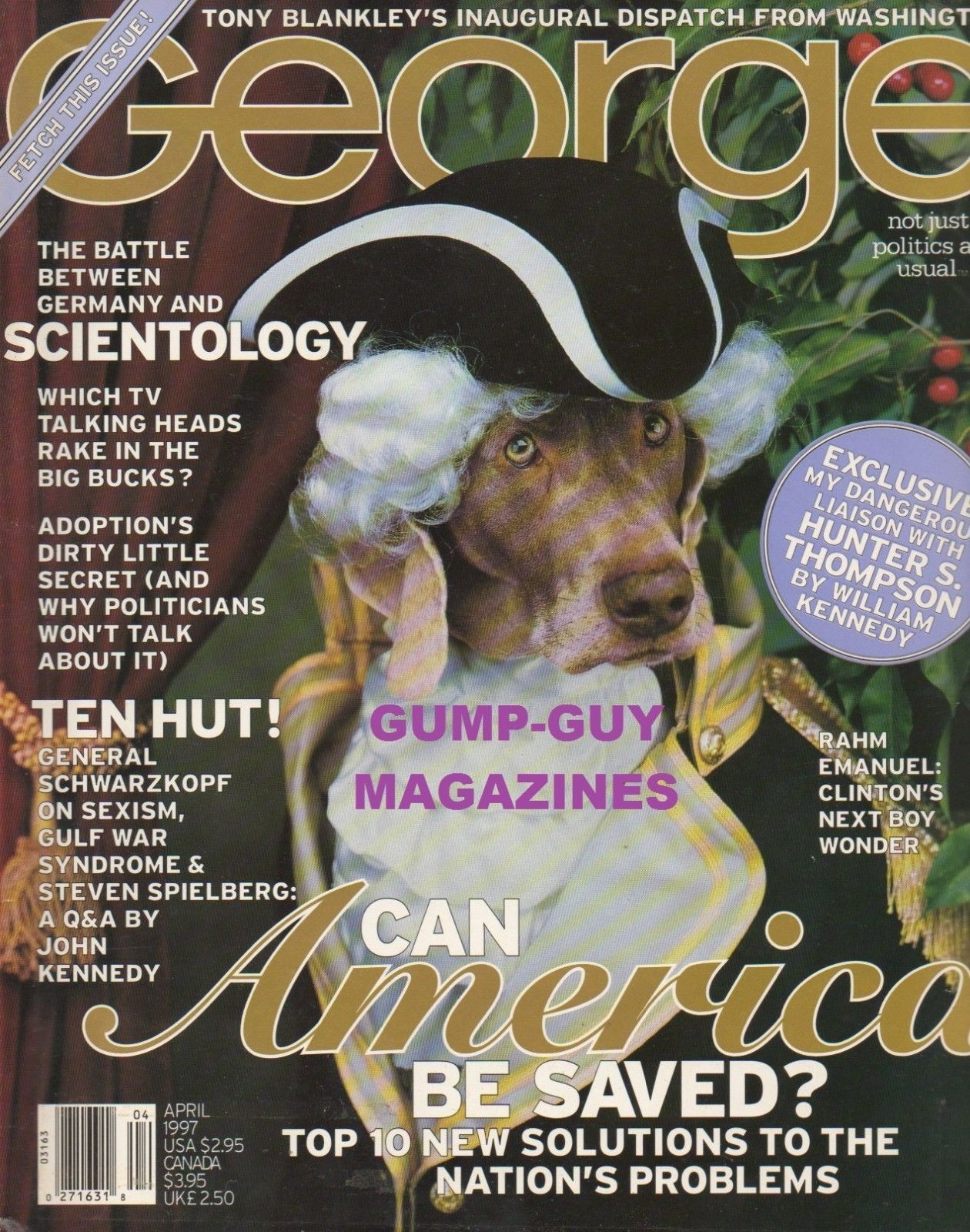George Magazine Interviews David Morehouse
George Magazine Interviews David Morehouse
GEORGE Magazine
Article: Psychic Espionage is Weird
Interviewer: Richard Lamb
April 1997
Q&A With David Morehouse from George Magazine

Psychic Espionage is Weird – even for the CIA. Now, a refugee from this $20 million program, David Morehouse, tells Richard Lamb what it’s like to be an out-of-body, out-of-mind, other-worldly spy.
He served as aide-de-camp to two generals and as a company commander in the elite Army Rangers, and everyone said that David Morehouse was on the fast track to becoming a general himself. But a seemingly assured path to martial glory was brought to a shattering end in the Jordanian desert ten years ago. A training accident left Morehouse subject to unearthly visions and led, so he claims, to his recruitment as a psychic spy for the U.S. Army
As a kooky spook, Morehouse joined the army’s deeply obscure “remote-viewing” program, code-named Stargate, a Pentagon and CIA venture from 1972 to 1995 that trained ultraselect individuals to transcend time and space. Such people would, Morehouse says, “view persons, places, or things in time or space and gather intelligence information on the same.” As a remote viewer, Morehouse undertook hundreds of missions. They included an astonishing attempt to go back in time to revisit Korean Airlines Flight 007, moments before it was shot down by Russian planes over the Sea of Japan. (He was asked to find out if the plane really did have an intelligence-gathering capability.) Morehouse was also sent to inspect the burning oil wells, lit by Saddam Hussein’s Republican army during the final days of the Gulf War, to see if they were a cover for the release of toxic gas by the Iraqis.
Eventually, Morehouse’s life in the world of remote viewing became too much for him (the not-to-be-underrated psychic burnout factor working in concert with general angst about the military-political-industrial complex produces its own special paranoia). It derailed his marriage, alienated him from his family, and waylaid his career. In turn, he became apprehensive about Stargate techniques. Encouraged by an angelic vision to “work for peace,” Morehouse violated his military security agreement and went public in 1993. He was threatened with a court-martial, though the proceedings were dropped in November 1994 when Morehouse announced that he would resign his commission. Now reunited with his wife and family, Morehouse has helped found the American Association of Remote Viewers, Inc., and has written about his experiences in a recent book, Psychic Warrior. Meantime, remote viewing was axed by the CIA and Pentagon in 1995. It seems that the 20-year program, which might have cost as much as $20 million, was not cost-effective.
Richard Lamb: Tell me about the persons, places, or things you visited
David Morehouse: Here’s an example: If there was a new Soviet MiG fighter back in the Cold War days and we wanted to know what that aircraft’s capabilities were, well, what better way of finding that out than by augmenting all the other intelligence-collecting platforms with remote viewers. We were asked to target the mind of the test pilot and glean the subtle nuances of what it’s like to fly the aircraft – if it’s sluggish, is there insufficient power in a steep banking turn?
Richard Lamb: It’s several thousand miles to the nearest Soviet airspace. What was it like to get from here to there?
David Morehouse: When I made my separation from the physical body, I would fall through this tunnel of light, and I would feel myself falling and falling, and I wouldn’t know whether I was up or down, losing all sight of everything I was in and what my orientation was. And then, I would hit a membrane of some sort, pop through it, and find myself in the target area.
Richard Lamb: And you could then “view” the target?
David Morehouse: The image of being there – it can be almost as clear as being in this room. Almost. Never quite as clear as sitting here right now. It’s much more fleeting. It’s obscured. It’s like looking around in a dream state, through a fog.
Richard Lamb: Was your army career prior to Stargate a successful one?
David Morehouse: I was a third-generation army officer. I was the honor graduate of every class I went to. I was the distinguished honor graduate of airborne school, my ranger school as a cadet, and my officer’s basic course. The army came very easily to me.
Richard Lamb: What made you a candidate for the Stargate program?
David Morehouse: I was a Ranger company commander, and I was training Jordanian rangers when I was accidentally shot in the head by a machine gun. The round didn’t penetrate my skull: It lodged in my helmet. But still its kinetic energy was significant enough to knock me out for a considerable amount of time. While I was knocked out, I had the first of many visions.
Richard Lamb: How did you feel about this?
David Morehouse: Words of angels, the paranormal, ghosts, apparitions – these were definitely not within my worldview, and I had no lexicon to support what was happening to me. So I was a very troubled young man.
Richard Lamb: Who actually recruited you for the Stargate program?
David Morehouse: The command psychologist of the army intelligence unit I was assigned to at the time. He wasn’t actively searching for individuals to feed into the Stargate program. However, when I presented him with my nightmares and experiences, he simply had to follow up and tell the Stargate management about me.
Richard Lamb: Do other countries have remote-viewing programs?
David Morehouse: The Czechs, the Chinese, the Russians. Ivan Sokolov [who was, according to Morehouse, head of the Soviet equivalent of Stargate] took the rest of his followers out of the Soviet remote-viewing program and was hired by the Sony Corporation, allegedly as a research and development asset but most assuredly as an industrial-espionage asset.
Richard Lamb: How did the U.S. program originate?
David Morehouse: We found out – and when I say “we” I mean the U.S. government – that the Soviet Union was heavily involved in paranormal research. The CIA then wanted to find out if there was any validity to it. They used hard physical science – not starry-eyed, New Age guru, candleburning, incense-burning, crystal-wearing-type stuff. What came out of this was, yes, people can see remote in time and space and can bring back relatively accurate data.
Richard Lamb: Have you remote-viewed since leaving the army? You mentioned earlier that you believe TWA Flight 800 was accidentally brought down by a directed-energy weapon similar to a high-energy microwave – technology developed for the Star Wars program.
David Morehouse: The navy admits that the USS Normandy, an Aegis Class missile cruiser, was 185 miles away at the time of the accident. According to other sources who have seen the actual satellite imagery, the Normandy was, in fact, 35 miles away. We also know that the plane blew up some 30 miles from Brookhaven National Laboratory and from a secret naval weapons testing facility that is adjacent to Brookhaven. The speculation we’re working with is that the Normandy fired a target drone, which is why people on the shore saw this plume – this slow-climbing missile – arc through the sky Then they fired up a high-powered shore-based microwave and zapped the aircraft, and – oops! – there was something between them and the target.
Richard Lamb: You and others learned this by remote viewing?
David Morehouse: Absolutely All of the remote viewers saw an invisible beam of light, or energy, strike this aircraft and bring it down.
Richard Lamb: By leaving the Stargate program and writing about remote viewing, you violated a government security agreement. Do you see civilian and commercial applications for remote viewing that might make the breach worthwhile?
David Morehouse: If you use remote viewing in law enforcement, if you use it in science or medicine or medical research and development to find a cure for cancer or a cure for AIDS, that’s good. How does that work? Here you are, a cancer researcher. You’re standing at the threshold of some obstacle that you have to overcome. And the only way you have to do that is through standard research methodology. But at the same time you develop a line of questioning that allows remote viewers to see beyond the barrier and to pull back answers to those questions. Now, think of the magic of that.
Richard Lamb: One of the implications of your book Is that good and evil actually exist. Have we lost sight of that?
David Morehouse: Very much so. We are at a crossroads in human history. The understanding of good and evil in our lives and in our decision processes as a human species has been blurred. That’s what allows us in good conscience, to build a military-industrial complex that profits from a $900 billion-a-year global defense industry, marketing death and destruction across the face of the planet.



